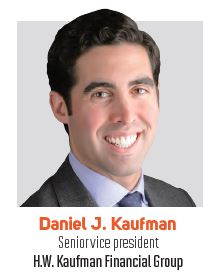
“Insurance industry regulation varies widely across the globe. With regard to the US, the federal government has mostly opted out of regulating insurance, with each state responsible for regulation based on local needs. It is a responsive and accountable system that relies on the expertise of individual state regulators, and
it has worked well for more than 70 years.
My expectation is that the federal government will maintain a policy of minimizing unnecessary regulation. While some regulation provides important consumer protections, over-regulation has the potential to limit product development or stall innovation. We will continue to advocate for a balanced approach.”

“Many would say yes, but I think there is a little more to this question. I do not believe the industry is over-regulated. Many of the rules handed down relate to good business practice. These allow us to stand on a global stage and say that our industry is among the best in the world, and both investors and clients are protected.
Perhaps the more pertinent question is: Are we paying too much for regulation? The answer to that is, emphatically, yes. Intermediary costs can be equivalent to employing an additional member of staff
– and in some cases, two.”

“The increased attention on conduct is placing resource pressures on the industry as it works to demonstrate the value of creating safe, sustainable products and services that highlight the industry’s duties to policyholders and are fit for purpose for the longer term.
The long-term nature of insurance relationships and the transformational changes in the industry, together with the regulatory constraints on changing insurance contracts, do create complexity for both regulators and insurers. However, both parties are determined to ensure that products, practices and behaviours maintain the best interests of policyholders, not just for today, but also into the future.”


 “Insurance industry regulation varies widely across the globe. With regard to the US, the federal government has mostly opted out of regulating insurance, with each state responsible for regulation based on local needs. It is a responsive and accountable system that relies on the expertise of individual state regulators, and
“Insurance industry regulation varies widely across the globe. With regard to the US, the federal government has mostly opted out of regulating insurance, with each state responsible for regulation based on local needs. It is a responsive and accountable system that relies on the expertise of individual state regulators, and “Many would say yes, but I think there is a little more to this question. I do not believe the industry is over-regulated. Many of the rules handed down relate to good business practice. These allow us to stand on a global stage and say that our industry is among the best in the world, and both investors and clients are protected.
“Many would say yes, but I think there is a little more to this question. I do not believe the industry is over-regulated. Many of the rules handed down relate to good business practice. These allow us to stand on a global stage and say that our industry is among the best in the world, and both investors and clients are protected. “The increased attention on conduct is placing resource pressures on the industry as it works to demonstrate the value of creating safe, sustainable products and services that highlight the industry’s duties to policyholders and are fit for purpose for the longer term.
“The increased attention on conduct is placing resource pressures on the industry as it works to demonstrate the value of creating safe, sustainable products and services that highlight the industry’s duties to policyholders and are fit for purpose for the longer term.